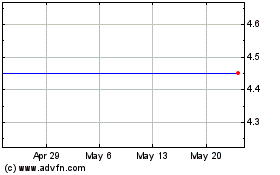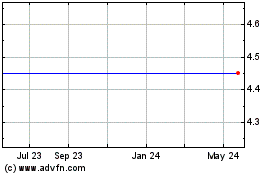Wilmington Trust Debuts New Fundamentally Weighted Mutual FundsRex Macey, Director of Equity Management, Wilmington Trust (Photo
05 December 2006 - 2:55AM
Business Wire
Wilmington Trust announced it is adding two new mutual funds,
Wilmington Fundamentally Weighted Large Company Fund and Wilmington
Fundamentally Weighted Small Company Fund, to its line-up of
domestic equity funds. The introduction of Wilmington Trust�s two
new fundamentally weighted mutual funds follows the company�s
recent launch of three fundamentally weighted separately managed
accounts for high-net-worth individuals. These separate accounts
focus on large company stocks, mid-sized company stocks, and small
company stocks, respectively. Combined, they have accumulated $155
million in assets under management. As with the new separately
managed accounts, the new mutual funds ascribe to an emerging
investment approach, often referred to as fundamentally weighted
index investing. This approach, which is rapidly gaining acceptance
in investor and academic circles, uses fundamental measures of a
company�s size, such as net income, dividends, and free cash flow,
to select securities. It stands in contrast to the market
capitalization approach of conventional index investing.
Fundamental weighting allows managers to take advantage of the
mispricings inherent in the financial markets and helps to avoid
what many observers believe is the essential flaw of conventional
index investing: that market-cap weighting, by definition, causes
investors to be overexposed to overvalued securities and
underexposed to undervalued securities. �Fundamentally weighted
portfolios represent an enhancement of market cap-weighted index
investing,� said Rex Macey, CFA�, CIMA, CFP�, vice president and
director of equity management for Wilmington Trust. �Conventional
indexing has strengths, including low operating costs and the
predictability of achieving substantially similar performance to an
unmanaged index. Maintaining proper portfolio balance, however, is
not one of them. Fundamentally weighted portfolios can help solve
that problem.� According to research performed by Mr. Macey�s
group, hypothetical portfolios built to reflect fundamental
measures of company size performed better than traditional market
cap-weighted benchmarks. And they did so without increased
volatility. This held true for portfolios of large-, mid-, and
small-sized companies. In addition, the research showed that
tax-loss harvesting of an otherwise passive portfolio can help
boost not only after-tax returns, but pre-tax returns, as well. It
is anticipated that Wilmington Fundamentally Weighted Large Company
Fund will hold several hundred stocks included in the Russell 1000�
Index, which represents approximately 92% of the U.S. equity
market. Wilmington Fundamentally Weighted Small Company Fund will
hold stocks included in the Russell 2000� Index, which is
constructed to provide a comprehensive and unbiased benchmark of
U.S. small company stocks. By one estimate, there is approximately
$3 trillion invested worldwide in portfolios that track indexes.
According to another estimate, nearly 12% of all U.S. mutual fund
assets are held in indexed portfolios. �We believe many investors
who are comfortable with conventional indexed portfolios will find
fundamentally weighted portfolios to be a sensible alternative,�
Mr. Macey said. �It�s similar to index investing, but with
intellect. This approach has the benefits of conventional index
investing � broad diversification, relatively low portfolio
turnover and cost, tax sensitivity � without the drawback of
chasing overpriced stocks.� Wilmington Trust Corporation (NYSE:WL)
is a financial services holding company that provides Regional
Banking services throughout the Delaware Valley region, Wealth
Advisory Services for high-net-worth clients in 22 countries, and
Corporate Client Services for institutional clients in 81
countries. Its wholly owned bank subsidiary, Wilmington Trust
Company, which was founded in 1903, is one of the largest personal
trust providers in the United States and the leading retail and
commercial bank in Delaware. Wilmington Trust Corporation and its
affiliates have offices in California, Connecticut, Delaware,
Florida, Georgia, Maryland, Nevada, New Jersey, New York,
Pennsylvania, South Carolina, Vermont, the Cayman Islands, the
Channel Islands, London, Dublin, and Frankfurt. For more
information, visit www.wilmingtontrust.com. You should carefully
consider the investment objectives, risks, charges, and expenses of
the Wilmington Funds before investing. A prospectus with this and
other information may be obtained by calling 800-336-9970 or by
visiting www.wilmingtonfunds.com. The prospectus should be read
carefully before investing. The Wilmington Funds are distributed by
Professional Funds Distributor, LLC and through Wilmington
Brokerage Services Company, a Wilmington Trust affiliate. Rodney
Square Management Corp., a Wilmington Trust affiliate, is the
funds� investment adviser. The funds are not deposits of, or other
obligations of, or guaranteed by Wilmington Trust or any other bank
or entity. They are not insured by the FDIC or any other
governmental agency. Mutual funds involve risk, including loss of
principal. Investing in smaller companies presents a greater risk
of loss than investing in larger companies. Past performance is no
guarantee of future results. Indexes are unmanaged and cannot be
invested in directly. CFA� and Chartered Financial Analyst� are
trademarks owned by CFA Institute. Certified Financial Planner
Board of Standards Inc. owns the certification mark CFP�, which it
awards to individuals who successfully complete initial and ongoing
certification requirements. Russell Investment Group owns the
Russell 1000� and Russell 2000� trademarks as well as service marks
and copyrights related to its indexes. Wilmington Trust announced
it is adding two new mutual funds, Wilmington Fundamentally
Weighted Large Company Fund and Wilmington Fundamentally Weighted
Small Company Fund, to its line-up of domestic equity funds. The
introduction of Wilmington Trust's two new fundamentally weighted
mutual funds follows the company's recent launch of three
fundamentally weighted separately managed accounts for
high-net-worth individuals. These separate accounts focus on large
company stocks, mid-sized company stocks, and small company stocks,
respectively. Combined, they have accumulated $155 million in
assets under management. As with the new separately managed
accounts, the new mutual funds ascribe to an emerging investment
approach, often referred to as fundamentally weighted index
investing. This approach, which is rapidly gaining acceptance in
investor and academic circles, uses fundamental measures of a
company's size, such as net income, dividends, and free cash flow,
to select securities. It stands in contrast to the market
capitalization approach of conventional index investing.
Fundamental weighting allows managers to take advantage of the
mispricings inherent in the financial markets and helps to avoid
what many observers believe is the essential flaw of conventional
index investing: that market-cap weighting, by definition, causes
investors to be overexposed to overvalued securities and
underexposed to undervalued securities. "Fundamentally weighted
portfolios represent an enhancement of market cap-weighted index
investing," said Rex Macey, CFA(R), CIMA, CFP(R), vice president
and director of equity management for Wilmington Trust.
"Conventional indexing has strengths, including low operating costs
and the predictability of achieving substantially similar
performance to an unmanaged index. Maintaining proper portfolio
balance, however, is not one of them. Fundamentally weighted
portfolios can help solve that problem." According to research
performed by Mr. Macey's group, hypothetical portfolios built to
reflect fundamental measures of company size performed better than
traditional market cap-weighted benchmarks. And they did so without
increased volatility. This held true for portfolios of large-,
mid-, and small-sized companies. In addition, the research showed
that tax-loss harvesting of an otherwise passive portfolio can help
boost not only after-tax returns, but pre-tax returns, as well. It
is anticipated that Wilmington Fundamentally Weighted Large Company
Fund will hold several hundred stocks included in the Russell
1000(R) Index, which represents approximately 92% of the U.S.
equity market. Wilmington Fundamentally Weighted Small Company Fund
will hold stocks included in the Russell 2000(R) Index, which is
constructed to provide a comprehensive and unbiased benchmark of
U.S. small company stocks. By one estimate, there is approximately
$3 trillion invested worldwide in portfolios that track indexes.
According to another estimate, nearly 12% of all U.S. mutual fund
assets are held in indexed portfolios. "We believe many investors
who are comfortable with conventional indexed portfolios will find
fundamentally weighted portfolios to be a sensible alternative,"
Mr. Macey said. "It's similar to index investing, but with
intellect. This approach has the benefits of conventional index
investing - broad diversification, relatively low portfolio
turnover and cost, tax sensitivity - without the drawback of
chasing overpriced stocks." Wilmington Trust Corporation (NYSE:WL)
is a financial services holding company that provides Regional
Banking services throughout the Delaware Valley region, Wealth
Advisory Services for high-net-worth clients in 22 countries, and
Corporate Client Services for institutional clients in 81
countries. Its wholly owned bank subsidiary, Wilmington Trust
Company, which was founded in 1903, is one of the largest personal
trust providers in the United States and the leading retail and
commercial bank in Delaware. Wilmington Trust Corporation and its
affiliates have offices in California, Connecticut, Delaware,
Florida, Georgia, Maryland, Nevada, New Jersey, New York,
Pennsylvania, South Carolina, Vermont, the Cayman Islands, the
Channel Islands, London, Dublin, and Frankfurt. For more
information, visit www.wilmingtontrust.com. You should carefully
consider the investment objectives, risks, charges, and expenses of
the Wilmington Funds before investing. A prospectus with this and
other information may be obtained by calling 800-336-9970 or by
visiting www.wilmingtonfunds.com. The prospectus should be read
carefully before investing. The Wilmington Funds are distributed by
Professional Funds Distributor, LLC and through Wilmington
Brokerage Services Company, a Wilmington Trust affiliate. Rodney
Square Management Corp., a Wilmington Trust affiliate, is the
funds' investment adviser. The funds are not deposits of, or other
obligations of, or guaranteed by Wilmington Trust or any other bank
or entity. They are not insured by the FDIC or any other
governmental agency. Mutual funds involve risk, including loss of
principal. Investing in smaller companies presents a greater risk
of loss than investing in larger companies. Past performance is no
guarantee of future results. Indexes are unmanaged and cannot be
invested in directly. CFA(R) and Chartered Financial Analyst(R) are
trademarks owned by CFA Institute. Certified Financial Planner
Board of Standards Inc. owns the certification mark CFP(R), which
it awards to individuals who successfully complete initial and
ongoing certification requirements. Russell Investment Group owns
the Russell 1000(R) and Russell 2000(R) trademarks as well as
service marks and copyrights related to its indexes.
Wilmington (NYSE:WL)
Historical Stock Chart
From Jun 2024 to Jul 2024

Wilmington (NYSE:WL)
Historical Stock Chart
From Jul 2023 to Jul 2024
